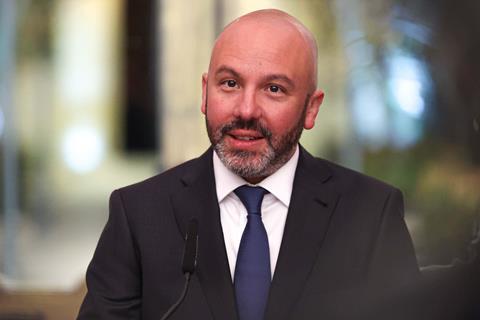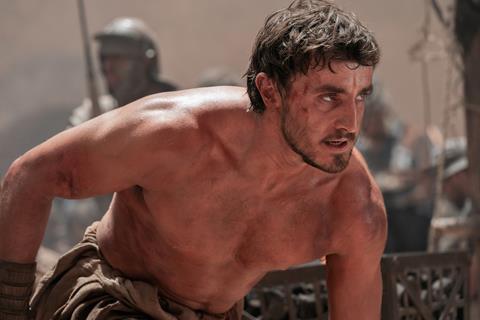
Malta Film Commissioner Johann Grech has all the statistics at his fingertips.
“The numbers do not lie,” he says as he shows off various charts and graphs with ink spiking upwards to indicate the ongoing boom in the country’s film sector.
According to data pulled together earlier this year by Dr Aaron G Grech, chief economist of the Central Bank of Malta, “taking into consideration films produced between 2005 and 2024, the industry has contributed more than €1.3bn to the Maltese economy”.
That is a huge figure and the benefits, the study claims, are being felt in every sector of the Maltese economy from hotels and restaurants to retail and even agriculture, forestry and fishing.
“For every Euro that we invest in film, it generates three back for the economy. We are not a burden on the treasury. We are actually giving more money to the government than other sectors,” says Grech, warming to his theme. In 2023 alone, he continues, Malta had its “best year ever in filmmaking – the film industry generated nearly half a billion”.
Grech spoke to Screen on the eve of the third edition of the Mediterrane Film Festival (June 21-29), at which industry heavyweights such as US filmmaker Catherine Hardwicke and UK producer Jeremy Thomas will be participating.
“The goal of the festival is to [work] as a business strategic tool to attract more FDI [foreign direct investment] to Malta,” says the commissioner.

Local media outlets have often given the film commissioner a rough ride, questioning the real benefit to the island republic of the generous 40% tax rebate for international producers.
Grech, though, can point to the many major features that have shot in Malta since he assumed the post in late 2017, among them Ridley Scott’s Napoleon and Gladiator II, and the two most recent Jurassic World features, 2022’s Dominion and this year’s Rebirth.
“When I became film commissioner, I promised there would be economic growth in the film industry. People thought I was over-promising but it happened,” says Grech, who insists that filmmaking in Malta is no longer seasonal, as used to be the case with workers on short-term contracts, but has become a year-round activity offering full-time employment.
Building success
Multiple productions are now shooting in Malta, according to Grech (full list below), ranging from films to reality TV shows, employing 1,300 crew members (of whom more than 1,000 are local) and using up to 50 different Maltese locations.
“Success is success. All of the numbers show that our programme worked,” he says. “Even during the pandemic, our industry kept on working. Even when there was a global [US writers and actors] strike, our industry kept on working because our strategy is focused not just on studios but also on independent filmmakers.”
An estimated 70% of the projects that shoot in Malta are from either the UK or the US. Grech describes the UK, with which Malta signed a memorandum of understanding two years ago, as a “key partner”.
Asked about US president Donald Trump’s proposed threat of tariffs on “foreign films”, the commissioner strikes a predictably coy note: “We need to be prudent in the language we use. We are more for collaboration [with the US] than for confrontation. For me at this stage, there wasn’t any effect.”
Underlining his optimism, Grech and his team are looking to ramp up the infrastructure. It now looks as if, “after 61 years of talk,” there may finally be progress on long-gestating plans to build a sound stage.
“This is our missing piece,” Grech says, showing Screen a newspaper cutting from 1964, a few months before Malta’s independence from the UK, in which studio facilities were already being discussed.
Malta has long had its famous water tanks. The first was built in 1964 for The Bedford Incident, a naval thriller starring Richard Widmark and Sidney Poitier. A second was constructed in 1979 to host the shoot for Lew Grade’s infamous Raise The Titanic.
Planning permission for the sound stage was approved in 2022 and a blueprint has been drawn up for a facility that will also hold another water tank (this one indoors). Grech is briefing the government on the project and expects to meet potential investors at the Mediterrane festival “to measure interest”.
He refuses to set an opening date for the new facility but expects it will take “around two years” to build, and once completed will add to Malta’s reputation as a key destination for international productions.
“It is also pride for us, being a small country but ambitious,” he says. “It is not about, ‘I am right’ – but it proves we are moving in the right direction.”
Projects shooting in Malta (June 2025):
Go Away! – UK feature production (directors: Ed Kear, Cringo Williamson; producers: Gina Lyons, Kristyna Sellnerova)
Love Island Malta – Maltese reality show (production company: Media Exclusive Ltd.)
New Wave – VFX project (UK)
Apollo Has Fallen – UK TV series (production companies: Studiocanal, Canal+, Urban Myth Films, Millennium, G‑Base; creator/showrunner: Howard Overman)
Bells (working title) – US feature (production companies: Legendary Pictures, Netflix)
The Madame Blanc Mysteries (season four) – UK TV series (production companies: Saffron Cherry Productions, Clapperboard Studios)
Easy – US feature production
Overboard For Love – US reality show (production companies: Unwell Productions, Jeff Jenkins Productions, 3BMG, Walt Disney Television Alternative)

























No comments yet